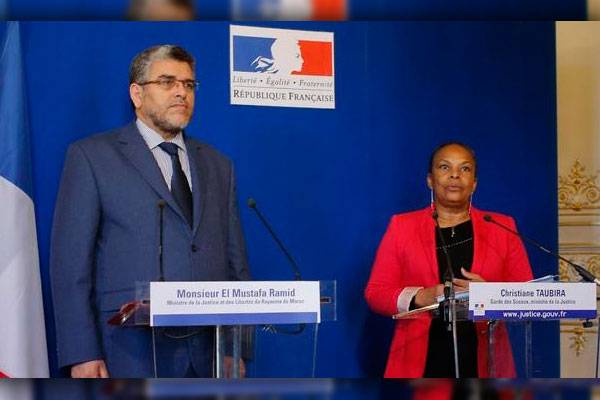
After a year-long rupture, France and Morocco restored their cooperation in legal matters on Saturday, a move allowing closer counterterrorism cooperation.
Morocco suspended judicial cooperation with its former colonial master in February 2014 after French police attempted to arrest the visiting head of Moroccan intelligence in response to an activist suit accusing him of torture.
The suspension of cooperation has hampered coordination on mundane legal matters for citizens of the two countries as well as working on counterterrorism issues. The discord impacted overall relations between the longtime allies.
In the wake of the attack earlier this month on the Charlie Hebdo satirical magazine in Paris by Islamic radicals, France was more eager than ever to restore legal coordination, Moroccan media reported.
The joint statement said the Moroccan Justice Minister Mustapha Ramid met with French counterpart Christiane Taubira on Thursday and Friday and, after months of discussions, they modified the accord to address mutual concerns.
They said the accord allows for deeper and more effective cooperation while respecting each other’s laws and institutions. It didn’t elaborate, but said the agreement adds to already strong ties between France and the North African kingdom.
“The heads of state King Mohammed VI and President Francois Hollande wanted to end this situation and preserve the exceptional partnership between the two countries,” French Justice Minister Christiane Taubira said in a statement on Saturday.
The spat was triggered by French police turning up at the Moroccan ambassador’s residence to question intelligence chief Abdellatif Hammouchi — who wasn’t present — over a complaint for torture filed by a suspicious Moroccan resident in France. Hammouchi had been accompanying the interior minister for a four-country meeting.
Morocco and France are both deeply concerned by the large numbers of its citizens leaving to fight with the Islamic State group in Syria and Iraq.
In Europe, France has provided the largest number of recruits, many of whom are of North African origin.
More than 1,000 Moroccans have left to fight in Syria and Iraq.
